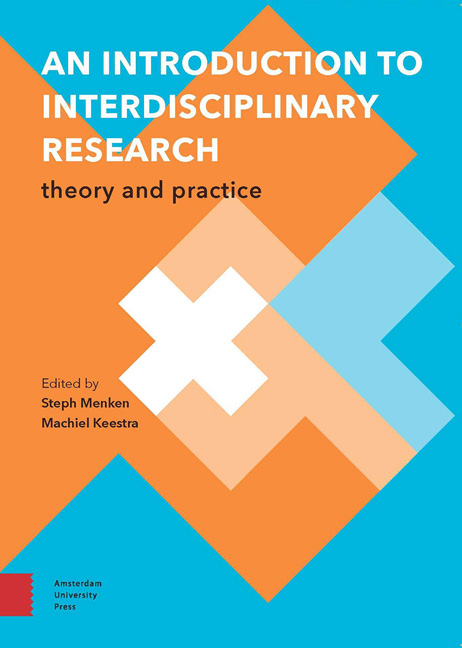Book contents
- Frontmatter
- Contents
- Acknowledgements
- Preface
- Part 1 The Handbook - ‘The What’
- 1 Introduction
- 2 What is Science? A Brief Philosophy of Science
- 3 The Disciplines
- 4 Interdisciplinarity
- 5 Complexity: The Main Driving Force Behind Interdisciplinarity
- 6 Interdisciplinary Integration
- Part 2 The Manual - ‘The How’
- 7 The Interdisciplinary Research Process
- 8 The Problem
- 9 Theoretical Framework and Research Question
- 10 How to Collect and Analyze your Data
- 11 Discussion and Conclusion(s)
- Part 3 Interdisciplinary Research in Practice
- 12 Interdisciplinary Research Example: Fogponics
- 13 Interdisciplinary Careers
- Further Reading
- References
- Colophon
9 - Theoretical Framework and Research Question
- Frontmatter
- Contents
- Acknowledgements
- Preface
- Part 1 The Handbook - ‘The What’
- 1 Introduction
- 2 What is Science? A Brief Philosophy of Science
- 3 The Disciplines
- 4 Interdisciplinarity
- 5 Complexity: The Main Driving Force Behind Interdisciplinarity
- 6 Interdisciplinary Integration
- Part 2 The Manual - ‘The How’
- 7 The Interdisciplinary Research Process
- 8 The Problem
- 9 Theoretical Framework and Research Question
- 10 How to Collect and Analyze your Data
- 11 Discussion and Conclusion(s)
- Part 3 Interdisciplinary Research in Practice
- 12 Interdisciplinary Research Example: Fogponics
- 13 Interdisciplinary Careers
- Further Reading
- References
- Colophon
Summary
It is now time to turn the preliminary research question into a researchable research question. By developing a theoretical framework that addresses your preliminary research question, you will be able to describe the ‘state of the art’ in your field of interest, sharpen your ideas, and then formulate a better, more specified research question. This part of the research process is described in this paragraph (and displayed in figure 17).
Considerations:
□ Consider all relevant theories, concepts, and assumptions that each discipline can contribute.
□ Where do disciplinary theories overlap? Where can you find or create common ground?
□ Is it possible to integrate the theoretical frameworks of the relevant disciplines?
As discussed in chapter 6, communication between (disciplinary) perspectives is a first important step towards integrating these perspectives. So an important question is how to enhance communication within your interdisciplinary research group? First and foremost, an understanding of one's own discipline is needed if a useful conversation between academics from different disciplines is to occur. In other words, one should be familiar with the theories, concepts, and methodologies that are central to one's discipline and realize how these and other ingredients make up the Science Cycle according to which scientific research of your topic is conducted (see chapter 2 on what science is). One could also answer the following questions as a way of bringing the disciplinary perspective to the forefront (partly after Paul & Elder, 2014):
□ What is your disciplinary perspective on the problem?
□ Which insights is this perspective based on?
□ What are the strengths and weaknesses of this perspective?
□ What are the borders of your disciplinary perspective in researching the problem? That is to say: where do you see opportunities to collaborate with other disciplines?
The second and arguably the most important skill to enhance communication (and thus integration) across disciplines is critical self-reflection. Different methodologies to enhance conversation between academics of different disciplines have emerged, and they all stress the importance of academics’ self-reflection on their (disciplinary) assumptions, mindset, and background. Lélé and Norgaard (2005), for example, emphasize that all researchers operate with implicit assumptions that are based on personal values and are guided by their discipline, to the exclusion of others. Reflecting on your personal values and assumptions can be a daunting task: how can you reflect on ideas you may not hold on a conscious level?
- Type
- Chapter
- Information
- An Introduction to Interdisciplinary ResearchTheory and Practice, pp. 68 - 88Publisher: Amsterdam University PressPrint publication year: 2016



